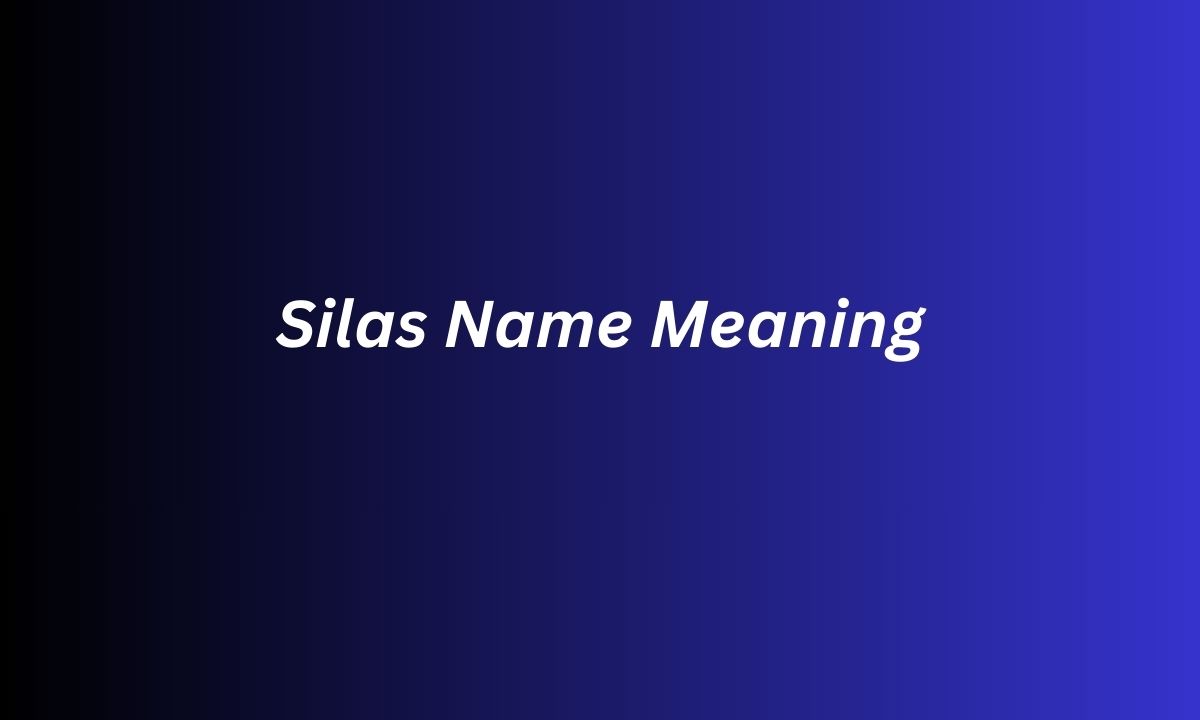The name Silas holds deep historical and cultural significance, carrying layers of meaning that go beyond a simple label. Understanding the Silas name meaning helps uncover both its linguistic roots and its enduring popularity across centuries.
Names often influence personal identity and perception. Exploring the Silas name meaning allows us to appreciate how traditions, cultures, and languages preserve values through names. This exploration also shows how timeless names adapt to modern contexts while retaining their dignity.
By studying the Silas name meaning, one gains insight into the broader study of language, communication, and expression. This article also connects with related concepts, including how meanings shift over time, polite alternatives in communication, and the importance of context in word usage.
Silas Name Meaning
The name Silas is of Latin and Greek origin, believed to be derived from “Silvanus,” which means “of the forest” or “woodland.” Silvanus was a Roman god associated with forests, fields, and nature, making the name deeply connected to natural symbolism.
In the Christian tradition, Silas appears in the New Testament as a companion of the Apostle Paul. This biblical association strengthens the perception of the name as faithful, loyal, and spiritually grounded, reinforcing its use across many cultures.
Today, the Silas name meaning conveys ideas of resilience, wisdom, and closeness to nature. Parents often choose this name for its strong sound, classical heritage, and enduring appeal. It resonates equally well in formal, professional, and personal settings.
Exploring Meaning in Language
The study of a name like Silas naturally leads us to reflect on how meanings in language evolve. Words and names take on new shades of interpretation depending on time, culture, and situation.
One related concept is hiatus meaning. In English, a “hiatus” describes a pause, break, or interruption. Just like the name Silas transitioned from ancient forests to modern contexts, the word hiatus demonstrates how meanings shift across settings and uses.
Exploring polite, professional, and casual alternatives to terms such as “hiatus” shows how flexibility in expression enriches communication. Choosing the right word or phrase—whether in daily conversation or formal writing—ensures clarity and respect.
Alternatives to “Hiatus Meaning”
When people use the word hiatus, they often mean a break, pause, or gap. However, in professional, casual, and polite contexts, different alternatives might be more suitable. Below are 15 examples, each explained with tone, usage, and examples.
1. Pause
A simple, neutral word often used in casual speech.
Example: “Let’s take a pause before continuing the meeting.”
2. Break
Direct and common in both casual and professional contexts.
Example: “She is taking a short break from her studies.”
3. Interval
More formal, often used in structured contexts like events or schedules.
Example: “There was a short interval between the two sessions.”
4. Intermission
Polite and often used in performance or entertainment contexts.
Example: “We enjoyed refreshments during the intermission.”
5. Gap
Casual, describing spaces in time or events.
Example: “There was a two-year gap in his career.”
6. Suspension
Formal, often used in administrative or academic contexts.
Example: “The project faced a temporary suspension.”
7. Lull
Gentle, polite, and expressive of a calm pause.
Example: “There was a lull in the conversation.”
8. Respite
More refined and formal, often suggesting relief.
Example: “She welcomed the respite after a busy week.”
9. Recess
Formal or institutional, frequently used in schools or courts.
Example: “The students are on their summer recess.”
10. Downtime
Casual and modern, associated with rest or recovery.
Example: “He enjoys downtime by reading books.”
11. Time Off
Professional and casual, commonly used in workplaces.
Example: “She requested time off to recharge.”
12. Sabbatical
Professional and academic, referring to extended leave for study or growth.
Example: “He is on a sabbatical to pursue research.”
13. Rest Period
Polite and clear, suitable in both casual and professional contexts.
Example: “Workers are entitled to a rest period during shifts.”
14. Cease
Formal and strong, suitable in legal or official contexts.
Example: “They agreed to cease operations temporarily.”
15. Breather
Casual, friendly, and informal.
Example: “Let’s take a quick breather before we continue.”
Choosing the Right Alternative
Selecting the best alternative depends on tone, audience, and context. For professional environments, words like suspension, interval, or sabbatical work best. In casual settings, pause, breather, or downtime sound more natural.
Polite expressions such as respite and lull convey sensitivity, especially when addressing delicate situations. Formal contexts, including academic or legal writing, require precise words like recess or cease. This demonstrates how flexibility in word choice enhances communication.
Understanding these nuances helps us not only in daily interactions but also in professional writing, speeches, and personal conversations. Language thrives when tailored to the needs of situation and audience.
Conclusion
The Silas name meaning reflects both natural origins and biblical significance, symbolizing strength, loyalty, and wisdom. At the same time, exploring the concept of hiatus meaning and its alternatives shows how language adapts to different tones and contexts.
Names and words carry histories that shape how we use them today. Whether through the timeless heritage of Silas or the flexibility of words like “pause” and “respite,” language demonstrates its enduring ability to connect people meaningfully.

Elizabeth crafts heartfelt messages for every occasion—anniversary wishes, love notes, prayers, thank-yous, and inspirational greetings—bringing warmth, joy, and connection to your special moments.










